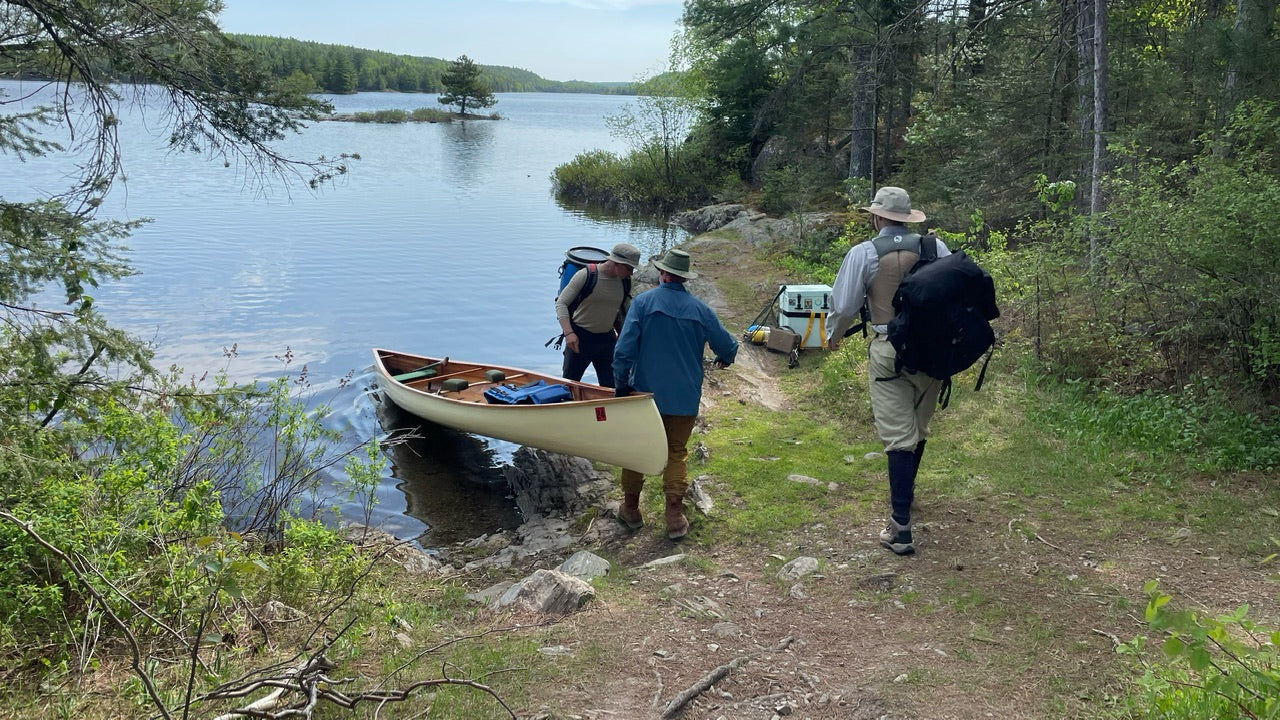BWCA Gear Checklist
In this blog, I want to cover what my group and I believe are the necessities to pack for your next BWCA (Boundary Waters Canoe Area) trip. I've been going to the BWCA since I was 5 with my family. And if I've learned one thing about BWCA trips, you learn something new every time. We keep refining this list after every trip trying to balance create comforts and basic necessities. Its always seems like we bring too much stuff. The list will change based on time of year, number of portages, and the trip objectives.
Before I go into the list, I want to point out that the idea is that what you take in is what you're taking out, whether you're doing zero portages or fifty portages, and leave little to no trace behind. Please respect the rules that BWCA has in place.
Pro Tip: When packing, try to reduce the number of loose items you have to almost zero. Everything goes in a pack. Loose items cause greater fatigue when portaging , high chance something gets left behind, or snags on a trees.
What is your portage style?
Ultra Light: Bring the basics, eat dehydrated food, and one trip portages.
Practical: Add some creature comforts such as chairs and cooler for real food.
Basecamp: Not going to portage or one/two easy ones; If it fits in the canoe bring it.
Now Its time for this List, lets take a look...
The Check List
- Canoe (s)
- Paddles (Have one extra per canoe) Avoid using paddles as walking sticks and pry bars for getting the canoe off shore.
- Life jackets - Keep Firestarter & lighter, whistle, and knife in life jacket.
- Yoke Pads - Your yoke pads are your best friend.
- Maps - Carry Waterproof map bag and one per canoe.
- Tents (Stakes, Poles) - make sure to check your tent stuff sack before you go - yes we have forgot tent poles before.
- Rain Fly
- Rain Gear - Get great rain gear (jackets & pants)
- Firestarter - Birch bark works great. High traffic camp sites can be picked over. We started making our own which is pretty simple. Egg carton with wood shavings and wax. Lent from the dryer works great as well.
- Matches/Lighter
- Canoe Packs, Dry Bags, and/or backpacks - Consider having a day pack for when you going fishing or on a day trips. Fill with essentials, as if you were to end up stranded.
- Trash bags and zip locks - Helps keep things dry and separated. Remember you're gonna have to carry your trash out.
- Toilet Paper
- Biodegradable soap - Although it is biodegradable, still wash dishes and yourself away from the lakes. P.S. Wash everything away from your campsite, same with emptying out your portable sink if you have one.
- Any necessary medicines
- Sunscreen - We do bring it, but we don't use it often.
- Water bottles - Nalgene bottles are popular, but any good water bottle will work.
- Pocket Knife
- Rope - For tying canoe up, hanging tarps and clothe lines.
- Bungee cords and BdB straps - mainly for tarps or rain fly.
- Sleeping bags and compression sacks
- Sleeping pads
- Pillow- If you're sticking with the pack light tactic, I like to take a pillowcase and stuff my clothes in it.
- Money/Credit Cards/Traveler Checks
- Drivers/fishing license (Minnesota or Ontario)
- Bug Protection - Bug suit would be preferred
- Licenses Canoe
- Entry Permits (BWCA or Quetico)
- Extra tarp
- Repair gear - Duct tape, super glue, Leatherman, thread, and needle. Anything in that realm.
- First Aid Kit
- Camp saw or hatchet
- Water Filter - based on size of your group. Consider having two for more than 4 people.
- Winter Hat and gloves - Based on whether it can get cold, it never hurts to have a hat and pair of gloves as a safety feature.
- Lantern/flashlights/headlamps
- Food/Snacks - Use cold food first, then work into dehydrated food. Bring dehydrated food. Make portage trips more manageable, your cooler wont might not last more then three days, and there are some solid dehydrated meals out there you can experiment with, try testing them at home then packing what you're comfortable with making.
- Warm and cold weather clothing - Pack according to the projected weather of the closest city to where you're going and always bring a set of clothing for the opposite. We went on a trip where we were rained out for four days or so, and I poorly packed warm clothing and rain gear, leaving me in wet shorts, socks and shirt in front of the camp stove under a tarp trying to dry off in 40-degree weather. "Pack Light, Pack Right and Be Prepared".
- Bring extra clothing - Extra socks and long underwear. We also like to bring a set of clothing and leave it in the car so we have something clean to change into when we get back to the car.
- Compass
- Bear Containers or Suspending System - Make sure you can carry it through a portage.
- Food bag or drum - If you can use a small storage drums, it is preferred. If you take the bag option, make sure rodents can't eat through the bag. for example a thick plastic dry bag or a container that seals well.
- Lightweight camp stove or burners - Pack based on if you're portaging or not.
- Fuel for camp stove/burners/lantern
- Mess kit (plate/cup/utensils)
- Cooking utensils - Bring only what you need
- Pots and pans - Consider using lightweight gear for example, aluminum Dutch oven or backpack camp kitchen gear
- Portable camp sink - you can use a collapsible water bin. We like to use my fathers Sea to Summit camp sink.
- Dishtowel and or small sponge
- Plastic Cutting Surface/Board - If you're going to cook non-dehydrated food and plan to eat fish, have this guy. It's not easy to fillet a fish on a paddle!
- Fillet Knife - This will also be useful for your fishing trip.
- Instant coffee - If you're portaging, I recommend sticking with instant coffee or even tea.
- Cooking Oil or lard
- Swimwear - Don't bath with soup in the lake. It is bad for the ecosystem.
- Personal Hygiene stuff - Deodorant, tooth brush, and toothpaste.
- Glasses or contact lenses - If needed
- Ground Cloth - It's nice for keeping our packs and shoes off the ground, but I wouldn't call it a must-have in my book. we tend to ditch it if were doing a multiple portage trip.
- Compact Towel or extra towel - you never know what you'll need it for, but we tend to use it for keeping our cooler cool.
- Fish Breading - Personal favorite shore lunch.
- Hat with brim
- Sunglasses
- Fishing pole, reel, tackle - Remember, you don't need as much tackle as you think. I like to carry one compact Plano box with everything I need and a 2-piece spinning combo.
- Have a survival kit/Day pack - My father, and I have these day packs we use for easy access to necessities while traveling and day trips. I suggest you have something similar that includes: Compass, Firestarter, lighter or matches, your map, rain gear, water box for whatever devices you bring, hatchet or survival shovel, Toilet paper (unless you're cool with leaves P.S. learn what poison ivy looks like) extra rope, first aid, and Repair gear (duct tape/superglue/Leatherman/tread and needle).
- G.P.S. unit - S.O.S. option is ideal
Conclusion
These are the items that come to mind when our group is packing for our annual BWCA trips. This list is merely a list for you to get some ideas and jog your memory on what to pack for your upcoming BWCA trip. So when your trip comes around, you can minimize your last-minute purchasing list. This is not a step-by-step guideline. Remember to "Pack Light, Pack Right, and Be Prepared". One last note before you're on your way, what you take in you take out, including your trash. And leave no trace left behind. Enjoy your trip and make some lasting memories.

